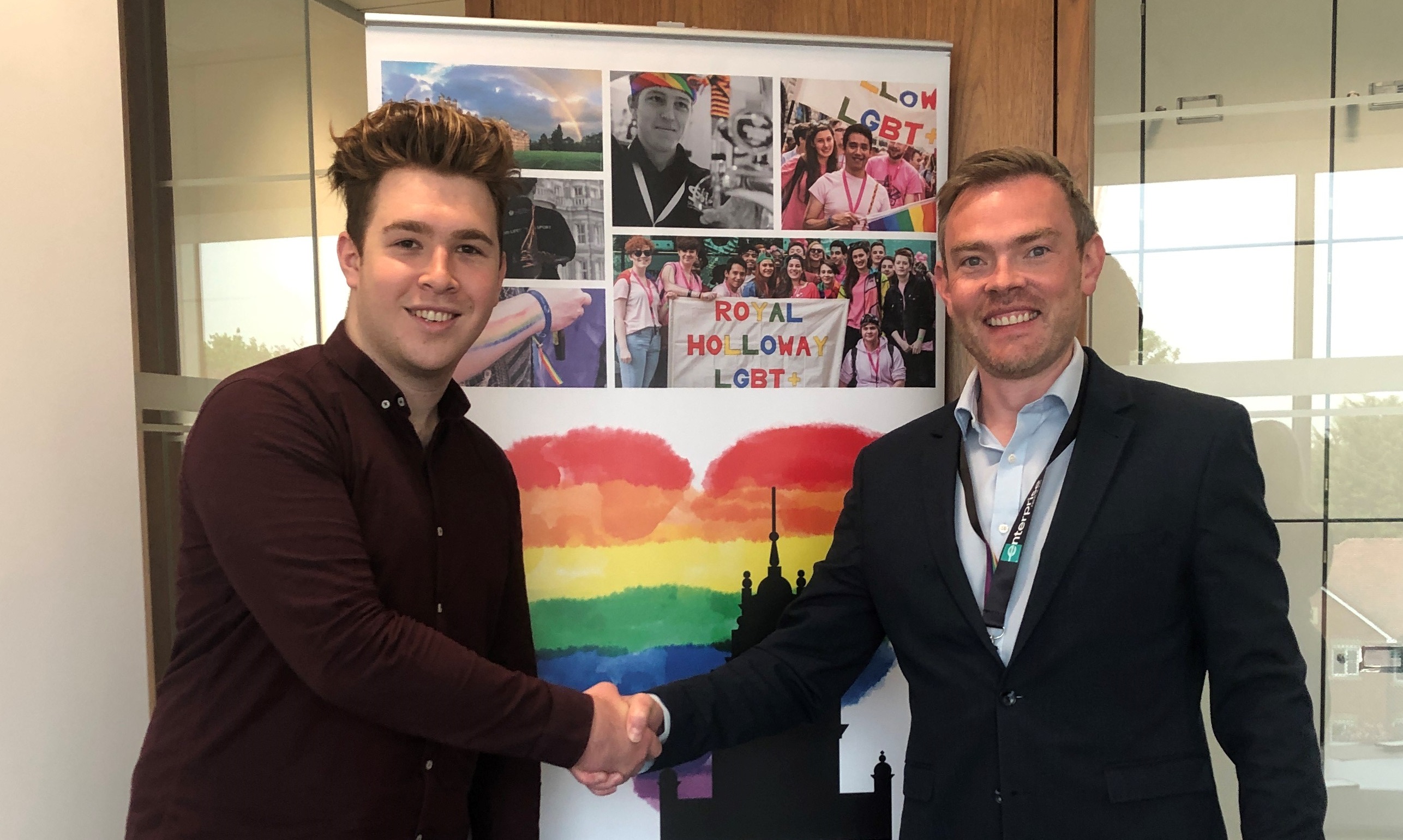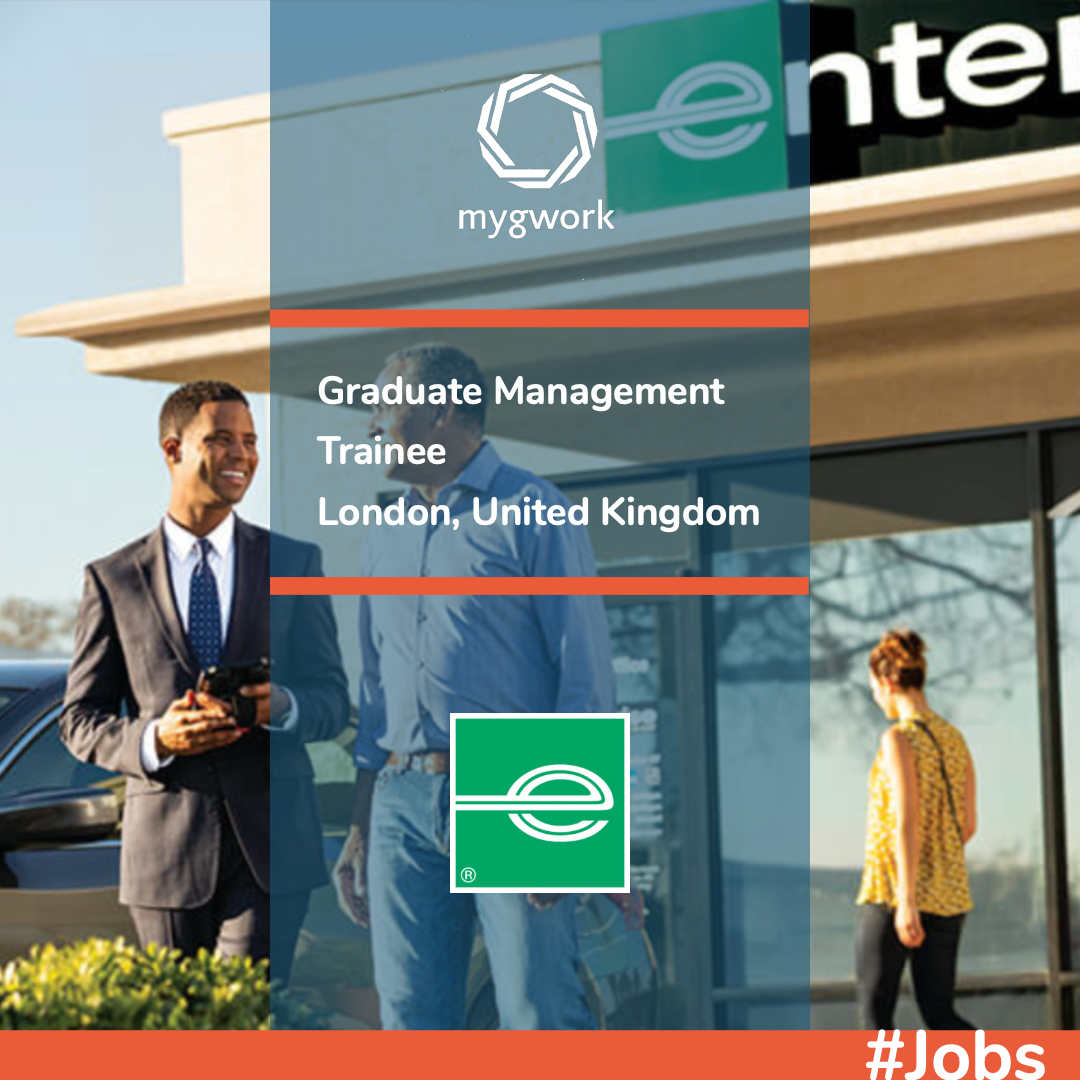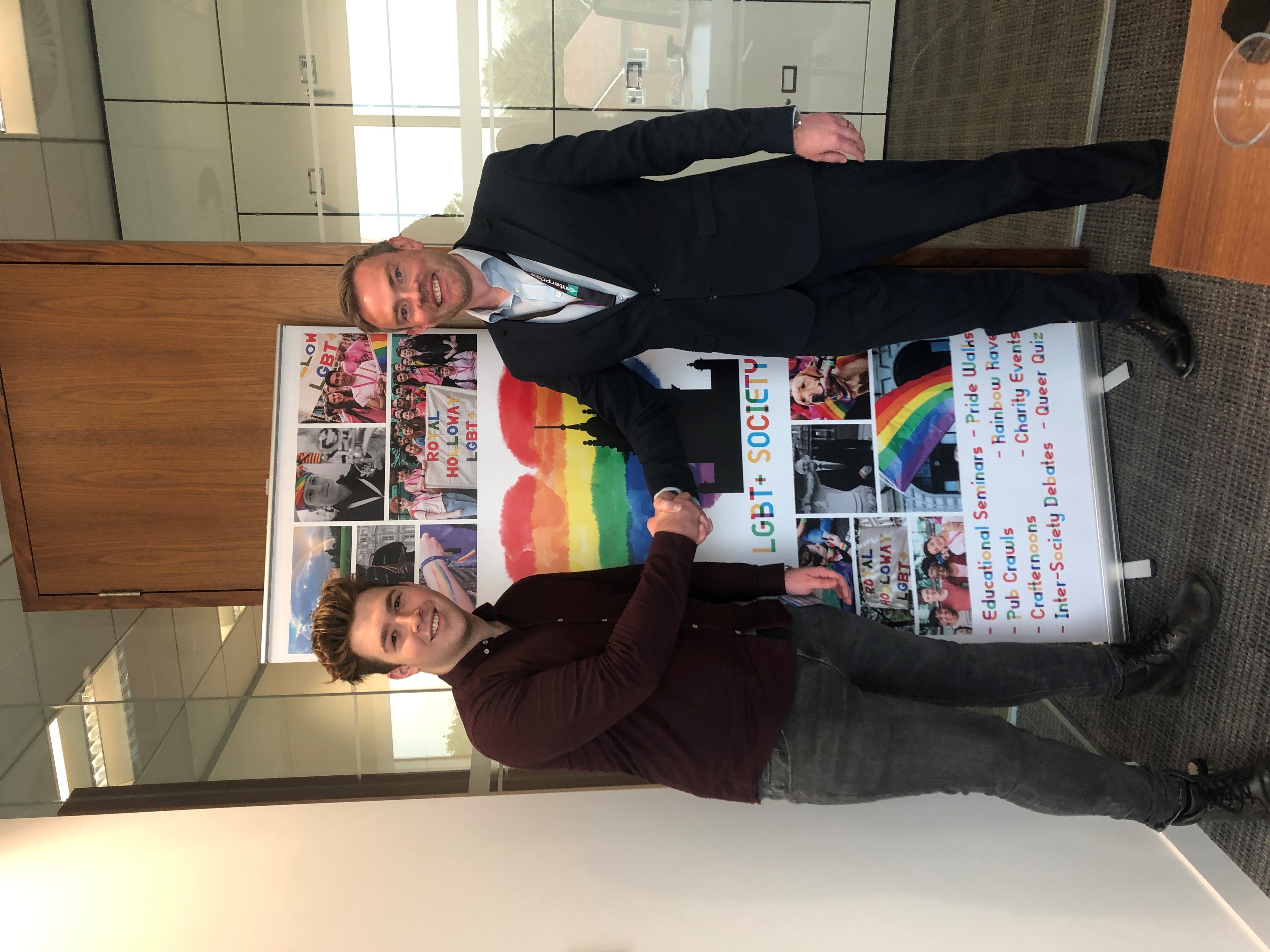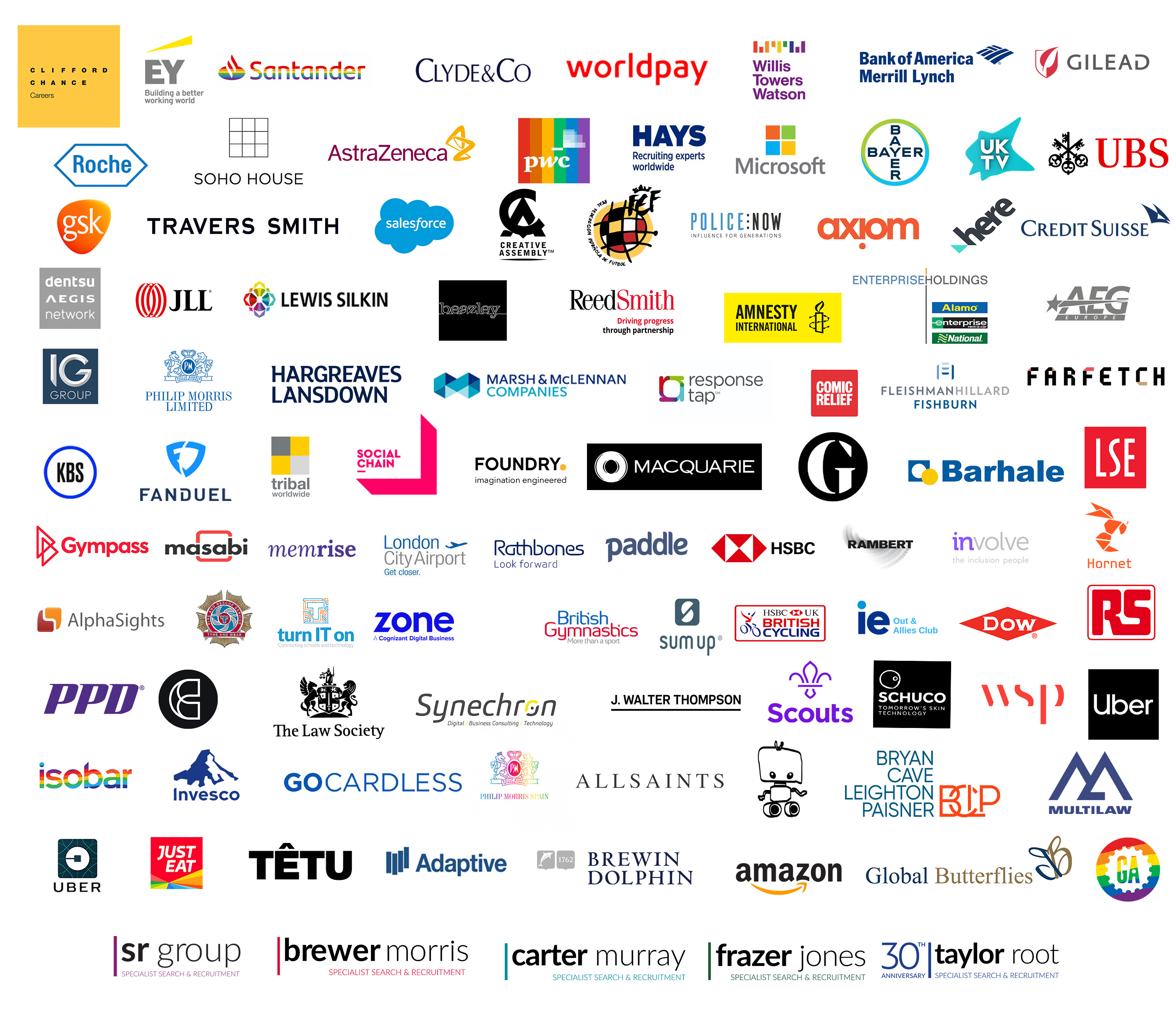‘Firms must do more to stop graduates going back into the closet’
Royal Holloway graduate Rhys Jones talks workplace inclusion with Enterprise Rent-A-Car's Ashley Hever and myGwork.
By Will Stroude

Promotional
Ashley Hever from Enterprise Rent-A-Car sits down with student Rhys Jones from Royal Holloway, University of London to understand how employers and students can work together to include the LGBT+ community and educate each other on best practices. Louise Sinnerton from myGwork listens in to find out what they talked about…
Rhys arrives at Enterprise’s offices in Egham, Surrey to meet Ashley, Director of Talent Acquisition for the UK & Ireland, who has been with the company for almost 20 years and is chair of Enterpride, the company’s Pride network.
Ashley asked Rhys, a second-year student of biomedical science and secretary for the LGBT+ society there, to visit to share their perspectives and get a better understanding of how they can work together:
Ashley: So, Rhys, how do you think students generally feel about starting a new job?
Rhys: I assume there’s always a bit of fear around starting a new job, perhaps anxiety and apprehension around who will be there, and whether or not you will make friends. When you come from an accepting environment that many people consider to be a safe place, you may feel that university life has lulled you into a false sense of security and that getting a new job means testing the waters. Often students aren’t aware of their workplace rights, or unaware of what there is to protect them if they are discriminated against in the workplace.
Ashley: That makes sense. And while employers might have employee groups or networks that match those at a university, there are things that employers can still do better. It’s about being transparent and making sure that people are comfortable from day one, which starts during the recruitment process, and continues when employees are onboarded.
Rhys: Absolutely, and being transparent about safeguards that are in place is a huge thing too. It’s not just about saying you’re friendly about this demographic, it’s about showing which mechanisms are in place if a problem arises.
Ashley: So, from your experience of the LGBT+ society at Royal Holloway, what questions do you think your members have when looking for a job? What do you think an employer could do to alleviate those concerns?

Enterprise are currently seeking a Graduate Management Trainee – click here to find out more.
Rhys: Well the questions are often around what legislation and safe space policies are in place, and around how people are supported in the workplace. People can ask businesses directly about how they integrate different groups and understand their ethos in terms of creating a cohesive diverse workforce. We can support this too, and as a society we can reach out to businesses to find out about this, and then help educate our members on what sort of questions they might want to be asking, and how to ask them. A question I would have for Enterprise and businesses like yours is whether there are external reports, and are there unions at work?
Ashley: Well, we have an employee assistance programme which is an external company that employees can call if they want any advice. Of course, then we give people Stonewall’s details too. There are lots of different mechanisms for people to report if something is happening. It’s also really important to have role models in the business, and people can contact anyone who is part of the Enterpride network. I feel really comfortable about what we do as an employer. We work really closely with Stonewall on different inclusivity policies and we’ve been recognised for our trans policies. One thing that’s key to us is making sure people have access to all sorts of resources, information and advice. Before people might think about their first job, what do you think they’re thinking about when trying to decide which university to go to? What stands out to an LGBT+ student?
Rhys: It’s important to see that the institution is taking LGBT+ visibility seriously – you can see this in the language they use in application processes and forms for example. These seemingly small things can show they are consistent, considerate and serious, not that they just “talk the talk”. It can be a warning sign when a company says “we are diverse” without explaining why they want to be or how they are. Personally, I’m always looking for the context around how people can talk about this at work.
Ashley: Definitely. I’d find it a warning sign if there we no examples of employees, too.
Rhys: Why do you think some graduates go back in the closet when they start working?

Ashley: Well I didn’t come out until after university, so for me it was a very personal reason. I did it a bit later in life, but if I’d realised just how easy it would’ve been at work, perhaps I would’ve done it earlier. Everyone has their own reasons, and a lot of employers are doing good work, but firms still need to do more as 62% of graduates go back into the closet when they start their first job. For some people maybe this is due to nerves or they don’t want to be labelled; perhaps some people are private or just don’t feel comfortable enough. Or for some, if they go in on their first day and there aren’t any networks, or the language isn’t there, or they don’t see diversity represented in the workplace, this can have a major impact. I think there can be so many reasons.
Rhys: I think fear is a big factor. Students often think their job prospects won’t be as good if they are openly LGBT+. It is easy for recruiters to say “there is a better candidate”, but you don’t know if they are prejudiced. Recently I spoke to a trans man and when he was job hunting he got substantially more positive responses when he didn’t disclose that he was transgender. (There are legal requirements to disclose this depending on which part of transitioning process you are in – so that was a big issue for him.) Also, when you’re in the business, if you’re being disadvantaged – for example, being given a bigger workload than others – that’s hard to prove really. Someone people want to be successful without being the LGBT+ poster person for their company. They want to be successful just because of their professional talents, rather than anything else.
Ashley: Exactly, and even if it’s not within your business, with clients or customers, you want to know that your colleagues will speak out if there’s anything inappropriate happening.
Rhys: True, and then for allies or people not in the LGBT+ community, I know that sometimes they can feel they are walking on eggshells as they are trying not to offend. That in itself can close off conversations – so part of coming out could be not wanting to make your peers uncomfortable. To resolve that we need to improve education in the workplace, have gender neutral bathrooms and just normalise pronoun usage to make sure people aren’t accidentally causing offence. It’s also important to think about how to deal with the transition without making people feel uncomfortable or without reprimanding them for unintentionally causing offence.
Ashley: Also, for me it’s important not to isolate things. Intersectional diversity is really important to me. We know gay men are more likely to commit suicide than straight men, for example. We need to bring the employee base together. Straight allies are extremely important too – they could have family or friends coming out as LGBT+ and need help and support as well.
Rhys: Off the back of that, I’d ask you if people have questions, how can they get in touch to find out more?
Ashley: Well if someone is joining Enterprise, I’d encourage them to reach out to HR and our employee networks so we can connect them to a whole host of resources. There’s nothing wrong with asking questions, whichever company you’re talking to, and I’d say if it doesn’t look real or authentic, don’t be afraid to ask.
Enterprise Rent-A-Car is a corporate member of myGwork, the LGBT+ business community.

